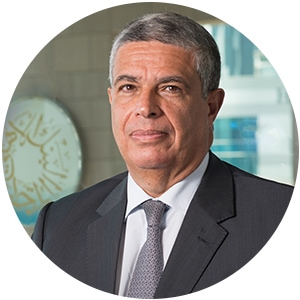Economic uncertainty across the Middle East is likely to continue in 2017. Despite the challenges ahead, AUB’s group CEO and managing director says it is well positioned to weather the storm.

Global Finance: How is the bank coping with the challenging regional operating environment? Are you more positive on the outlook for the region this year?
Adel El-Labban: The bank has coped well and has become adaptable to changing operating conditions, with 2016 net profit up by 6%. New business generation has been more challenging, market liquidity tighter and capital regulations more onerous. In response, we have focused on very rigorous asset/liability management and proactive risk assessment and recovery efforts.
Going forward, 2017 could be the eye of the storm. The shale revolution represents a paradigm shift in the hydrocarbon markets. By introducing new technology-driven sources of oil and gas, it has effectively provided a cap on prices charged by natural producers. Our view is that the current stresses and imbalances will grow in 2017 and we are accordingly budgeting for single-digit profit growth.
GF: Is AUB still focused on developing further a pan-regional financial services group model?
El-Labban: Yes. We continue to look for the missing parts in our targeted markets to complete our regional footprint. Our strategy, since inception, has been based on capitalizing on the flow of people, trade, investment and funds in the region through multicountry presences. AUB believes in true regionalism through acquiring strong, fully fledged licensed platforms in its markets, with the ability and reach to service 5% to 10% of the bankable population in each target country.
Our key primary markets are the Gulf Cooperation Council (GCC) and Iraq. These markets have similar economies underpinned by hydrocarbon-based wealth and cash flows. They have mostly US-dollar-pegged currencies, reducing earnings and capital volatility as AUB maintains its accounts in dollars.
Our key missing targets are Saudi Arabia and the UAE, with interest in expansion in some of our existing countries through the same market business combination. With regards to secondary markets, our main targets are Turkey and Switzerland.
GF: What about your banking activities in challenging markets such as Egypt, Iraq and Libya? Are they growing and profitable?
El-Labban: Egypt has been a very profitable experience; 2016 was a record-breaking year there for our business because we successfully positioned ourselves vis-à-vis the large Egyptian-pound devaluation.
Iraq is improving, but remains a security challenge due to terrorist activities. Here we target protection of capital, investing in low-risk Iraqi dinar-denominated T-bills, and extend foreign-currency facilities only to established clients with solid sources of repayment. Our Iraqi subsidiary is profitable, but underperforming our target return on equity levels, given the very tight risk guidelines that we implement. Longer term, we are cautiously optimistic as the Mosulliberation unfolds.
Libya is a very difficult market and the focus is on capital preservation. New activity is restricted to import trade transactions that are fully cash covered.
GF: Are you seeing success in the strategy of increasing cross-border intermediation?
El-Labban: Cross-border capabilities are a key differentiating factor for AUB. Our selection of target countries for acquiring banks depends on the existence of historical and long-standing demographic and financial flows. This ensures the availability of the necessary quantum of cross-border business to sustain this strategy.



